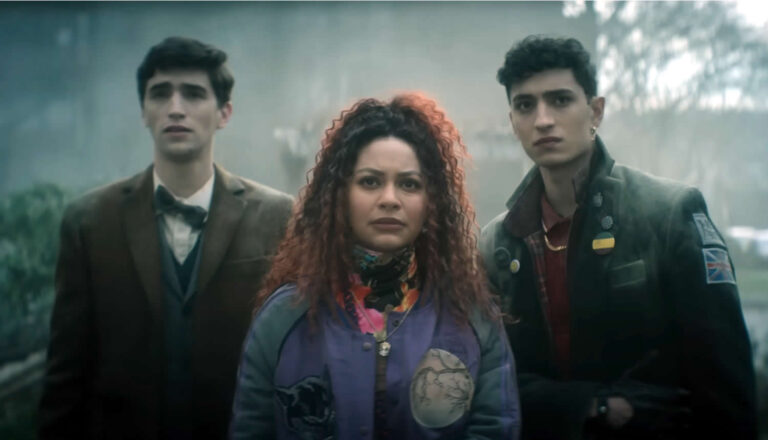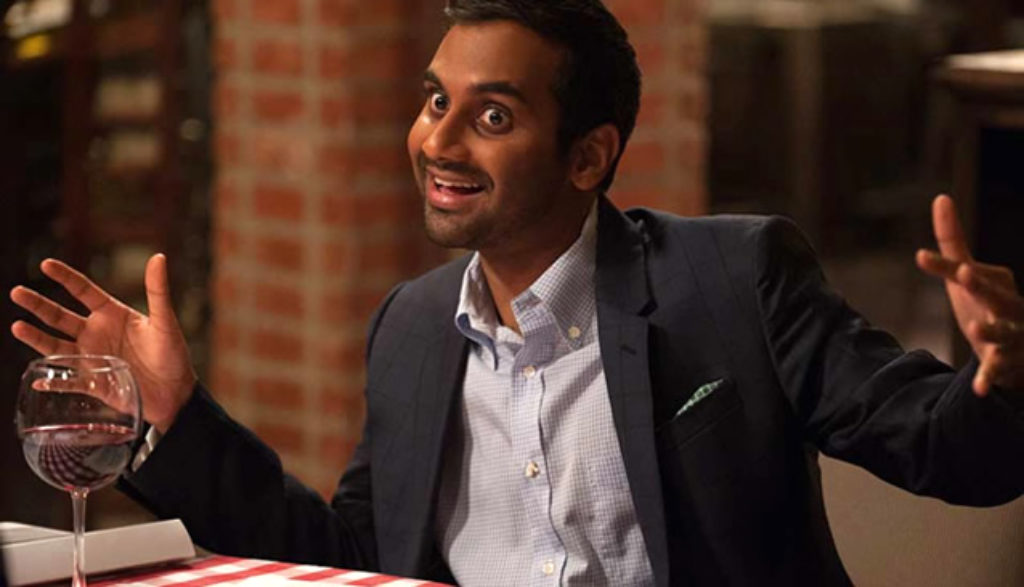
Dead Boy Detectives
Dead Boy Detectives targets teens in style and story. But it comes with very adult, problematic content.

The classic 1990s sitcom Seinfeld was famously a “show about nothing.” Focusing on four not so likable, not particularly ethical friends, the show adhered to a strict code: no hugging, no learning.
If Seinfeld was capable of raising a sitcom baby of its own, instilling all those non-lessons into its progeny and then watching, with non-pride, the resulting show grow into something that would take its non-values to the logical next level, that new program might look something like Aziz Ansari’s Master of None.
Ansari, a comedian, plays Dev, a semi-busy actor best known for his work on … commercials. He hangs out with a handful of fellow New Yorkers who also seem to have a great deal of spare time on their hands: sometime girlfriend Rachel, towering man-child Arnold, lesbian pal Denise. They go to parties hosted by people they don’t like very much, obsess over takeout food, sleep with anyone who seems to be willing and who bathes regularly.
And so we’re back to Seinfeld. Dev certainly seems determined to follow the “no learning” rule. Hugs are fine, as long as they’re either A) insincere, or B) a prelude to sex. But Ansari’s Netflix creation does rebel a bit from its Seinfeldian roots by not always being about nothing.
Indeed, it tackles racism … and concludes that it’s bad. It deals with sexism and sexual harassment … and decides that those things, too, are bad. It even suggests there’s some merit to sexual restraint. The guys, for instance, go out of their way to bust a guy who masturbates in public. And in the opening episode, when Dev is forced to buy a “Plan B” pill for his latest sexual conquest, Arnold wonders what the pill’s makers would say is “plan A.”
“I think plan A is that you don’t drop a million of your sperm into someone you don’t know that well,” Dev says.
Still, “know that well” is several zip codes away from “married for life,” and Dev certainly won’t be slipping on a purity ring anytime soon (or ever). The idea of just not engaging in casual sexual encounters feels so archaic here as to not even be worth joking about.
That’s hardly new in the world of comedic television. Such was the case in Seinfeld, too. And Friends. And any other show about single people in New York City, apparently. I’ve never lived in Manhattan, but I can only assume from television that to live in the borough you’re required to have at least one new sexual partner per month. And because this show is on the wild, wide-open forum that is Netflix, the sexual encounters here can look and sound pretty graphic. (There’s lots of hard-core swearing, too.)
That’s disappointing. Aziz Ansari (known for his work on Parks and Recreation) is a seriously talented guy. Critics have raved about Master of None, and I hoped I would like it too. But the world we enter here is not only morally unfamiliar, but also salacious and vacuous.
In an episode titled “Indians on TV,” Dev grapples with some of the crass, misleading and offensive Indian stereotypes found in movies and television. The episode earned a glowing review from Kayla Kumari Upadhyaya at the A.V. Club. She wrote, “Master of None acknowledges that ‘diversity’ shouldn’t just mean throwing one Indian guy into a show and calling it a day. What Dev, and the show, are asking for are richer, more varying representations of Indians on TV that aren’t rooted in racial stereotypes or assumptions about what Indian people should look like, speak like, or do. Master of None does so effortlessly.”
Indeed, if Master of None is doing its part to break down racial stereotypes, then I’ll add my bravo to the mix. And yet, watching the show as a Christian, I feel the same sense of disconnection that Dev experiences as an Indian: With its unremitting sexual promiscuity and casual vulgarity, the setup feels utterly alien to me. One-dimensional. Stereotypical.
“Seeing yourself reflected on television is something that’s easy for white people to take for granted,” Upadhyaya writes. “Hollywood goes over and above to cater to white viewers.” OK. But while I see lots of people who “look” like me (only prettier and younger, of course), it’s rare to see someone who seems to “be” like me—someone who shares my spiritual and moral values.
In the first two minutes of the series, viewers hear Dev having noisy sex with a woman he just met. Then we hear him blurt out the f-word five times in rapid succession when he realizes his condom broke. (In shadow, Dev appears to be nude.) The two rush to the pharmacy for a “Plan B” pill to deal with any possible pregnancy.
As Dev ponders the idea of fatherhood, we’re ultimately shown that, really, it’s a pain the neck. (A new-dad friend gets drunk in the wake of a birthday party, then tells Dev he’s divorcing his wife and that fatherhood is often terrible.) There are unseemly jokes about Dev helping a little girl in the bathroom. And a little boy is caught smearing his private parts across boxes of frozen waffles at a grocery store. His mother says he’s also taken to defecating in her shoes. Both kids throw tantrums.
Nicknames are given to various bits of sexual anatomy. There’s frank talk about the mechanics of sex and childbirth. Dev and Denise talk in crass detail about what she does before having sex with one of her female lovers.
Add six or seven more f-words to Dev’s outburst mentioned earlier. Also: four or five s-words, “h—,” “b–ch,” “p—” and “d–k.” God’s name is misused, once with “d–n,” and Jesus’ name is abused once.


Paul Asay has been part of the Plugged In staff since 2007, watching and reviewing roughly 15 quintillion movies and television shows. He’s written for a number of other publications, too, including Time, The Washington Post and Christianity Today. The author of several books, Paul loves to find spirituality in unexpected places, including popular entertainment, and he loves all things superhero. His vices include James Bond films, Mountain Dew and terrible B-grade movies. He’s married, has two children and a neurotic dog, runs marathons on occasion and hopes to someday own his own tuxedo. Feel free to follow him on Twitter @AsayPaul.

Dead Boy Detectives targets teens in style and story. But it comes with very adult, problematic content.

An elf mage contemplates on connection and regret as she watches her human friends grow old and pass away.